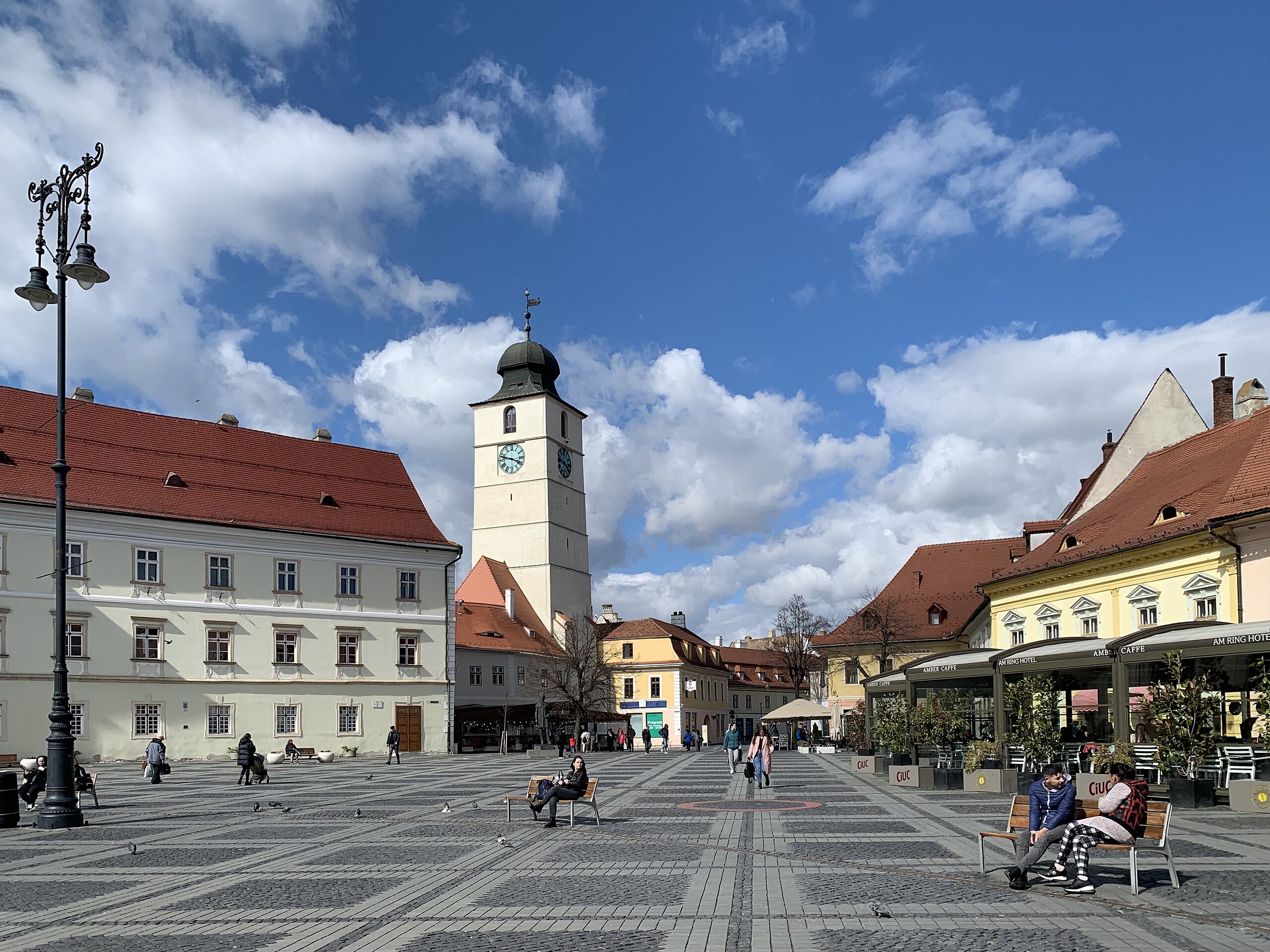by Irina Militaru
This essay was selected for publication as part of the War Prevention Initiative’s Essay Un-contest on Peaceful Elections.
It’s scorching hot, and I’m in a field in the middle of nowhere (i.e., the industrial zone of Frankfurt, couched between two factories and the highway), triple-checking if this is really where my euro-parliamentary voting station is supposed to be. As any good citizen of the diaspora, I found this address by sifting through the questionable design choices of the Foreign Affairs website of my home country, Romania, with no other source to confirm it. Finally, an encouraging sign: I hear people talking in my native language, so I go up to ask them about the voting station. Six wardrobe-shaped men, towering over me, stare me down from head to toe. They point to the warehouse and say: “You better vote with AUR. We’ll be waiting outside.”
AUR is Romania’s local Far Right franchiseTM (i.e., political party), whose electoral success this summer was predominantly due to the diasporic vote. There were many Far Right options on the euro-parliamentary ballot this year, including the pro-authoritarian coalition Patriots for Europe (PfE). AUR is so decidedly anti-EU that they were not invited to join PfE, campaigning instead as a rogue, anti-establishment unit with prominent party members even running as independents—and winning. But all Far Right parties across the EU share a common theme: fear-mongering over migration, one way or another. Because of this, there is little ideological difference between AUR, PfE, and other extreme right-wing movements around the world, seeming to borrow talking points and tactics from each other.
As the men block my path, I resist the urge to correct their shaky understanding of the limitations of the EU Parliament—that national parties have very little impact and that programs are made through transnational coalitions of parties loosely aligned in ideology, without affecting domestic policy—and instead thank them for their insight and walk away with lingering unease and confusion.
They were immigrants like me, having moved to Germany for opportunities that don’t exist back in Romania. Why would an immigrant vote for an anti-immigrant, Far-Right party?
Far Right parties in Western European countries have risen in popularity by convincing voters that migrants are simultaneously stealing jobs and refusing to work, choosing to live on welfare. At the national level, these parties bemoan the adherence to a borderless Europe with labor mobility, while swearing in every EU election to defend the ancient European (white) identity against the onslaught of non-EU (Black and brown) immigrants. However, in Eastern Europe, the main exporter of intra-EU migrants, the rhetoric is very different. AUR’s concern regarding migration is that “our people” are exploited and humiliated by rich Westerners.
In Romania, AUR targets ex-pats with slogans such as “Be free” and “Be respected,” playing on their frustration of being economically dependent on Western Europeans, who look down on them because of their nationality. I felt that too, countless times, as a first-generation immigrant. The sad truth is that, yes, we did leave our families behind because of poverty and lack of opportunities. Yes, we had to listen to comments about how backwards our cultures are without being able to talk back. Yes, we had to take jobs below our qualifications because our degrees are undervalued. I too want to scream until I’m heard by people at the top and tell them how angry and scared I am. Sometimes, I too feel like punching a wall.
Despite the incessant rhetoric on immigration thrown around by politicians, immigrants themselves have very little political representation in their host countries. Whether intra-EU or non-EU, migrants are used as talking points in a political discourse they have no agency over, and PfE parties do not distinguish between the two groups of migrants because they don’t believe in a united Europe of any kind. Voting is a right of citizenship, a category in direct contradiction to that of migration. By default, migrants don’t have a political voice in the host country and are increasingly removed from the voice they may have once enjoyed back home. Without the ability to effect social change in their immediate community, the only means of improvement remain through private enterprise, relying on businesses to guarantee basic social services. Due to the difficulties of accessing welfare from the neoliberal state and the struggle to afford necessary services in the private sector, survival becomes a tight-rope walk while democratic expression drifts further away.
The migrant’s lacking political voice has been brought up predominantly in reference to the Far Right’s appeal to the working class. The erosion of the welfare state has pushed low-income families to rely exclusively on the private sector for healthcare, education, etc., to the point where they can no longer afford meaningful participation in public life. The working class is sold on the lie that migrants and refugees are siphoning wealth from the West. Ignored is the fact that austerity programs following the 2008 financial crisis targeted middle- and working-class people and all the extra funds resulting from slashing welfare were used to prop up the banks and corporations that caused the crisis to begin with. In an economy all-too-willing to rid itself of workers’ rights, the rhetoric of scarcity and competition for resources (a staple of the capitalist worldview) became the mantra of the Far Right. By scapegoating immigrants for the failings of a disaster-oriented economic system, the Far Right makes it possible for supporters to justify any mistreatment or act of violence against them, from funneling migrant children into vocational studies despite their academic ability to capsizing refugee boats in the Mediterranean.
This neoliberal idea of resource scarcity prevents the European working class from empathizing with non-EU immigrants and refugees, for fear that any form of aid given to them diminishes what might be given to local working-class citizens, which the intra-EU migrant aspires to be considered. Instead of building a common front for dignity, good wages, and work-life balance, intra-EU migrants are trapped in resentment politics, choosing to vote against their own interest as a form of assimilation into the local working class.
Pitting workers against each other has always been a capitalist tactic, and its newest iteration is “good immigrant” (intra-EU) versus “bad immigrant” (non-EU), in which the former fails to realize they are just as despised as the latter. What really drives the European mythos is not the adherence to an agreement among member-states, but the history of imperialism and capital accumulation, along with the cultural and social development that comes with a drastic influx of wealth from exploitation. Only recently has the European consciousness expanded to include Southern Europe, moving away from the derogatory acronym PIGS (Portugal, Italy, Greece, and Spain). Furthermore, the insistence to limit the Schengen area only to the richest Western European countries, while hiring Eastern European immigrants only in low-skill, low-paying jobs, reinforces the idea that Europe remains, at least in its own self-image, a colonial power and uncontested beneficiary of capitalism.
Younger and still-hopeful intra-EU migrants may resonate with vague concepts like national identity or purity of language and culture. But to the jaded ones, who’ve lived through the early years of labor mobility, trusting shady recruiters and ending up in human trafficking networks or highly predatory contracts, voting for the Far Right is an act of both survival and self-annihilation.
It’s a strange place to be in, struggling to be accepted as a full European, but knowing that the European mythos was not made with you in mind. It’s unsettling to see yourself as an afterthought, and there are only two real choices ahead. You can band together with the other afterthoughts until you can no longer be ignored, or you throw your natural allies under the bus. One option is decidedly easier than the other and AUR takes it to the extreme, mythologizing Romanian-ness to the point of pseudoscience, in an effort to replace multiculturalism with an “us against the world” fever-dream.
It’s not optimism that drives their voters, but anger and the desire to shock respectable citizens, to make themselves visible while remaining anonymous, swapping the individual for national identity. When you only define yourself through your nationhood, you don’t need to think about your own humanity, or the humanity of anyone else. If it’s us against the world, the “I” can disappear.
Why did my diasporic countrymen vote for the Far Right that day? Because it was like punching a wall—it felt good in the moment, but now we deal with the pain.
Author

Irina Militaru has a MA in History and Anthropology and is teaching, writing, and working with immigrant and refugee girls in Frankfurt, Germany.
(Cover photo credit: Wikimedia Commons)

